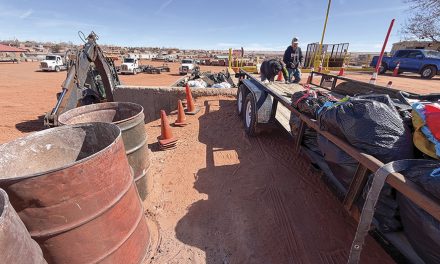
Letters: IEEFA is a modern-day colonizer
Since Navajo Transitional Energy Company announced the acquisition of three coal mines in the Powder River Basin, there has been a lot of opinions appearing on this page in the Navajo Times.
Unfortunately, many of the opinions have been grossly inaccurate, misleading and inflammatory, especially towards the NTEC management team.
I take issue with the recent guest column from the Institute for Energy Economics and Financial Analysis who have pushed the boundaries of common decency and exemplify the quote, “You are entitled to your opinion. But you are not entitled to your own facts.”
To this Navajo, IEEFA comes across as modern-day colonizers, bullies trying to scare Navajos into their line of thought. Let’s look at their recent handiwork in disrupting the lives of hundreds of Navajos.
Last week, there were many news reports of Navajo Generating Station finally closing. Also affected by the closure is the Kayenta Mine. Both facilities employed over 750 workers, nearly all Navajo, now those workers either have lost their jobs or had to relocate away from their families.
In case you have forgotten, IEEFA was one of the groups that were instrumental in feeding our Navajo leaders misleading information that led to a vote in tribal Council against the purchase of NGS and Kayenta Mine. The economic impact to the Navajo Nation and Hopi Tribe will be billions of dollars for years to come.
Now IEEFA is spreading falsehoods about NTEC’s purchase of three mines in Wyoming and Montana. Before I start exposing them for the frauds they are, let’s get in some facts about NTEC.
NTEC was formed in 2013, under the laws of the Navajo Nation. Since its foundation, NTEC has become one of the most profitable miners in the country and has been awarded numerous safety and reclamation awards.
NTEC is wholly owned by the Nation and is overseen by a professional board of seven members; six are Navajo. It is important to note that NTEC was established to be independent from the Nation with the right and ability to acquire assets on and off the Navajo Reservation.
NTEC currently supports over 350 salaried and hourly employees at the Navajo Mine, with a total approximate payroll of $40 million, nearly 85 percent of whom are Native American and mostly Navajo. By acquiring the Navajo Mine, NTEC preserved the adjacent Four Corners Power Plant (which is fueled exclusively by the mine) and 300 jobs, again a majority are Native American workers. Since purchasing the Navajo Mine, NTEC has taken a 7 percent ownership interest in the Four Corners Power Plant and is successfully selling power into the regional market.
By the way, since the NTEC management team took over the Navajo Mine and returned it to profitability, the total payments to the Navajo Nation are well over $200 million.
I’m curious, how many Navajo jobs or revenue to the Navajo people has IEEFA provided? The answer is zero, yet we already stated that this group will already cost the nation and the region billions of dollars for future generations.
Now let’s talk get back to the fallacy that NTEC purchased the Cloud Peak Energy assets in violation of Navajo Nation energy development policy. While there has been talk of changing the policy to reflect more renewable energy development, I refer the reader to the front-page story in the Oct. 24, 2019, edition of the Navajo Times, “Council kills renewable energy bill.”
It’s simple, NTEC can’t violate a policy that doesn’t exist. Again, IEEFA is entitled to their opinion, as misguided as it is, but they are not entitled to their own facts.
The bottom line, since IEEFA is concerned about NTEC’s finances, is that the newly acquired mines in the Powder River Basin are profitable. The previous owner was hampered with debt related to their larger operations and unsuccessful acquisitions. NTEC purchased the mines at a very low cost while avoiding the debt that hampered the former owner.
NTEC will not put the Navajo Nation or our people in financial danger.
Alex Osif
Kayenta, Ariz.
Elder’s house is ready to catch fire
To President Jonathan Nez,
Yá’át’ééh, my brothers and sisters, if I can call you that. I am here visiting my sister in Cedar Ridge, and what I found is that a house is set to kill Susie.
It is short circuit in the house and this house is going to combust like paper. The heater is not working, the dryer’s door doesn’t close and the most dangerous part is the electric part. All is set up in the attic, but it has no entrance to it.
You need to send someone today, not tomorrow – today!
I will not hold my wife. She has a video that shows all the issues with the things I mentioned, but most dangerous is the fact that if my sister turns the light switch in her room, it sparks and turns off. Then the living room light comes on and also goes off. She is ready to send that video to whomever she feels and if you want that kind of attention to our Nation, so be it.
You had the nerve to try to come and dedicate the house when you were told the electricity was not right. My sister told you and had the list ready of the things that were wrong, but you did not want to hear her. Well we are here now.
I am thankful to my wife that woke me up and showed me that you have perfected the corruption learned from the whites. Shame on you.
No lights at night for fear of a fire, so we expect you send an electrician today or you will have an interesting holiday season.
I am a Navajo like you, full-blooded like many of you and I am going to demand that you are brought to justice if my sister dies burning in this house because of an electric fire that will happen at any moment.
One of my brothers is a certified electrician and his recommendation was to have an electrician yesterday, but he like many Navajos, he is scared of you. Not me.
I have lived enough time among the white man to recognize evil and corruption and see it among my own people. And I am married to a woman that has helped me to understand that speaking out and demanding justice is not being aggressive or disruptor of harmony, it is the right thing to do, especially fighting for those who do not have a voice like the elderly that you abuse in this nation. Your choice.
David Slim
Metairie, La.
Deputy AG incident could have been handled better
First, the usual disclaimer — these are my personal views and not those of any past or present employer or client.
The dispute over the Navajo deputy attorney general’s request to the Navajo Supreme Court that 36 Navajo Nation Department of Justice attorneys be excused from pro bono service is sad and disturbing (“High court: Deputy AG illegally practicing law,” Nov. 21, 2019).
I had hoped that with the appointment of Chief Justice JoAnn Jayne and Attorney General Doreen N. McPaul that the relationship between the Supreme Court and the attorney general’s office would be characterized by the Navajo values of k’e and hozho, rather than the harshness which often characterized a prior chief justice and a prior attorney general.
I certainly do not question the merits of the Supreme Court’s analysis of what characterizes the practice of law, nor do I question the court’s conclusion that Deputy Attorney General (Kimberly) Dutcher’s request was in violation of the pro bono rules and should have been denied. I only suggest that there was really no need for a public shaming of the deputy attorney general.
Perhaps in the future such disagreements could be handled better, in which spirit I wish you all the best for Keshmish Yazie.
Lawrence A. Ruzow
Flagstaff, Ariz.
Arnold, I have many ‘favorite Indians’
“Who’s your favorite Indian?” Arnold asks as Victor is wrapped in the arms of his mother (in “Smoke Signals”).
Victor doesn’t have a favorite Indian. Not his mom, nor his dad. Victor literally does not have a favorite Indian, and considering his home life, you can’t blame him.
When watching the movie, at first you’ll probably laugh at drunken Arnold making a fool of himself, but after the scene concludes you’ll realize how tragic Victor’s response is.
If you ask a Native who their favorite Indian is, they will either laugh or reply with another memorable quote from “Smoke Signals.”
I’ve never thought much about the question until Indigenous People’s Day. I reflected on my heritage, my culture, and wondered whether or not I have a favorite Indian.
My favorite Indian is the one who sits and listens to their elders tell a story that they’ve heard a thousand different times. My favorite Indian is the elder who cares enough to tell a story a thousand different times to ensure that they are never lost.
My favorite Indian is the one who bangs the drum with their arm and sings from their heart. My favorite Indian is the one who both sings and listens to make sure that the songs are never forgotten.
My favorite Indian is the one who is in school, gaining as much knowledge as possible for all of the years America stripped us of an education and forced us to unlearn our culture instead.
My favorite Indian is the one who may be the only Indian in a classroom, but still works hard for all of the Indians who aren’t there with them.
My favorite Indian is the doctor, the lawyer, the schoolteacher, and the coach, who not only provides their time and effort in mentoring young Natives, but paves the way for more to work right alongside them.
My favorite Indian is the descendant who may not be enrolled, but walks with their head up, proud of who they are and where they come from.
My favorite Indian is strong. My favorite Indian is amazing. My favorite Indian is, well, Indian.
RaShawn Lemery
Spokane, Wash.
SMASE leadership a complete failure
Integrity has been defined as doing what is right even when no one is looking. Sadly, the board of directors and the executive director at St. Michaels Association for Special Education Inc. in Window Rock have failed to protect the integrity, the reputation, and the legacy of SMASE.
In May 2018, the board secretly adopted new bylaws, taking “official” board action in violation of their own internal rules.
The bylaws require that a 14-day notice be posted stating that amendments are being proposed. No notice was posted. Adoption of amended bylaws did not appear on the May 2018 meeting agenda. Adoption of the amendments was not recorded in the official meeting minutes.
Board members Anna Beth Nez, Edison Leslie and Margaret Sandoval have repeatedly refused to answer questions about taking official board action in secret, why the action item was not on the meeting agenda, and why the action does not appear in the official meeting minutes.
In the “new” bylaws, the board increased their own compensation. Prior to amending the bylaws, board members received only a flat rate of $150 for a regular meeting and $75 for special meetings.
With the amended bylaws, they now receive the flat rate plus mileage pay for meetings. They also receive mileage and meal payments for attending SMASE special events. These changes were made in secret with the executive director’s knowledge.
SMASE received over $1.1 million in the Ramah Navajo settlement regarding unpaid indirect costs. The SMASE Board and executive director completely failed to capitalize on this windfall. Four years after receiving over $1 million, as of Nov. 1, 2019, the balance is now just over $2,000.
The entire organization could have greatly benefitted from investment income generated from these monies. Investment income could have been used for employee compensation, for leveraging infrastructure funding, or for direct service resources.
The board members have never produced any results or given any reports. None of them attend any Special Olympics events. They rarely attend holiday activities such as the Christmas program or Thanksgiving dinners. None of the board members attend prom at the end of the year. Only one board member attends the employee appreciation banquet. None of the board members visit with employees or students at any time. None of the board members help with Special Olympics fundraising.
In August, SMASE honored Dig Deep, an organization that installed water filters and pipes on the SMASE campus. None of the board members attended the event. None of the board members participated in the Nov. 19, 2019, open house. The SMASE board members are invisible except for board meetings. And, for this, they feel they deserve more pay.
The board and the executive director miserably failed in protecting SMASE’s financial resources. In February 2017, Anna Beth Nez, the board president, directed that a grant writer to be hired, under supervision of the executive director.
In May 2019, the executive director reported that registering SMASE with government websites was the only accomplishment. No grant applications or proposals of any kind were written. SMASE paid over $8,000 with no results.
During the months the grant writer was being paid, none of the board members asked for a progress report. The executive director had four regular board meetings and an unknown number of special meetings in which to provide updates. She never did.
SMASE lost over $8,000 through the complete fiscal irresponsibility and lack of accountability by the board and the executive director.
The board and the executive director have shown that they do not care about families. For four years, family members have been pressing for a parent-family committee.
In 2015, the board directed the executive director to draft a handbook. Four years later, the best that the executive director could do is download and print out two parent handbooks from other schools. To this day, Michelle Spencer has failed to draft a handbook.
The board has failed to follow up on its own directive. For the past four years, every attempt to have the matter placed on a board meeting agenda has been denied by the board.
A family member has drafted a committee policy along with standing rules, yet the executive director has failed to offer these documents to the board.
Direct service employees have not received a pay raise in over 10 years. The only pay increase was from the state of Arizona raising its minimum wage.
SMASE’s 2015 IRS Form 990 shows that the executive director was receiving an annual salary of over $66,000. That is more than what the Navajo Nation president receives!
An administrator has already received a pay raise after only two years of employment, and that was after the board president openly called for a pay raise for that administrator during a board meeting. Meanwhile, direct service employees with five, 10, and over 15 years of service have yet to receive a pay increase.
When Michelle Spencer was named interim executive director, the board boasted that the most qualified person was selected. Yet, within two years, the board felt the need to grant her educational leave. No other employees have been given educational leave.
SMASE has no Navajo lead teachers in the Education Department. As a 50-year-old organization, all SMASE teachers should be Navajo. If the executive director can go on educational leave despite SMASE’s financial struggles, SMASE should be able to give the same opportunity to other employees. Indeed, under the Navajo Preference in Employment Act, SMASE has legal obligations to work towards a 100 percent Navajo workforce.
Other organizational issues and concerns that have been brought to the board’s and the executive director’s attention include: Special Olympics fundraising, general fundraising, compliance issues in the nursing department, lack of communication with families, lack of an active shooter/on-campus violence response plan, an unqualified executive director, board meetings not being publicized, and recruitment of new board members not being made public.
The SMASE board of directors and the executive director are supposed to be the organization’s top, most active leaders. Yet they continuously demonstrate a complete lack of leadership and integrity by refusing to address these issues and concerns.
To be sure, SMASE direct service employees continue to provide excellent quality care and services to SMASE students and consumers despite financial difficulties. Education classroom staff, DTA employees, transportation drivers and bus monitors, nursing staff, and residential employees all deserve great gratitude and appreciation. They deserve so much more than what the board and the executive director are giving. The direct service teams are the epitome of dedication and commitment. You cannot talk about dedication unless you have worked five, 10, 15 years without a pay increase. You cannot talk about commitment until you have worked for years for the same employer at minimum wage.
At a time when it would be so easy for a labor union to win representation for SMASE employees, the SMASE direct service employees remain persevering.
Leadership at SMASE needs to start doing what true leaders do — work hard and work long to acquire for their team the resources, incentives and finances to continue to succeed.
Kee Begay Jr.
St. Michaels, Ariz.








 Highway 264,
Highway 264, I-40, WB @ Winslow
I-40, WB @ Winslow